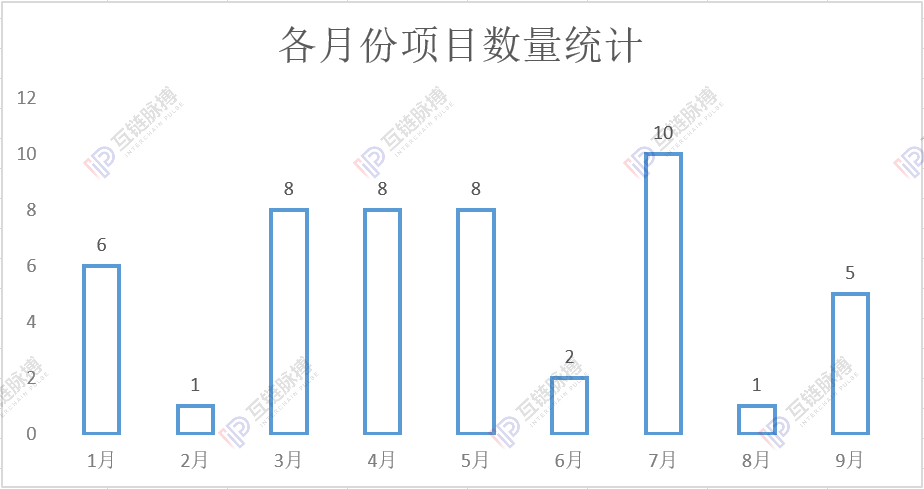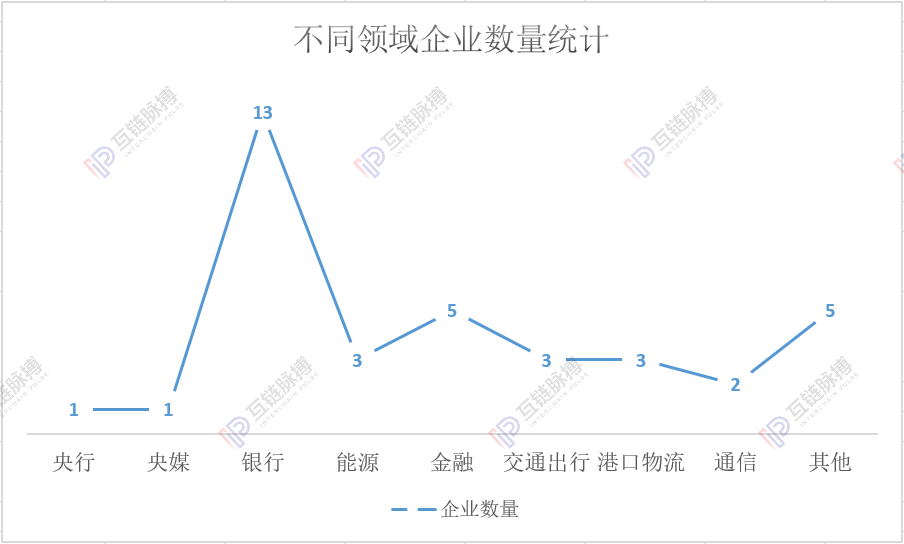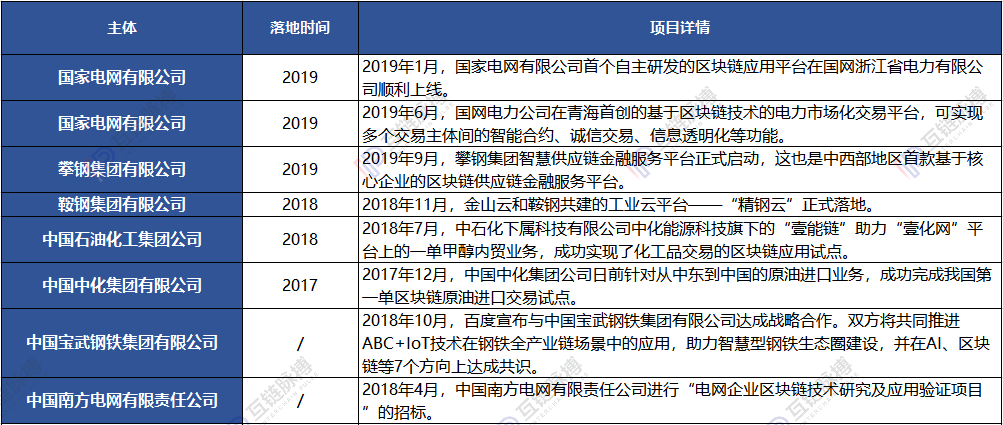State-owned enterprises enter! Blockchain application progress has exceeded 50 during the year
Text | Interchain Pulse · Black Pearl
On September 12th, the smart supply chain financial service platform under the Central Enterprise Pangang Group was officially launched. This is also the first blockchain supply chain financial service platform based on core enterprises in the central and western regions.
Similar to the supply chain financial service platform built by Pangang Group, in September, there were 5 cases of blockchain applications led by central enterprises or local state-owned enterprises. Since the beginning of this year, it has reached 36 state-owned enterprises and has landed 50 blockchain projects.
Inter-chain pulse observation of state-owned enterprises' landing projects, there are three reasons behind the 2019 landing acceleration: the application of blockchain judicial deposits has surged, and the blockchain application boom has been transmitted from government departments to state-owned enterprises; blockchain technology itself has matured. In 2019, the overall situation of land landing is good; the need for digital transformation of state-owned enterprises.
- Viewpoint | The boundaries between primary market and secondary market are slowly becoming blurred
- Market Analysis: Market sentiment still needs to be stable, BTC and mainstream currency enter the pending stage
- Singapore Banking Corporation OCBC Bank joins JP Morgan Chase Blockchain Network
With the huge user base owned by state-owned enterprises and the business areas that cover the fundamentals of life, perhaps the blockchain can enter the ordinary people's homes with this shareholder's wind, and at the same time pass the huge credit of state-owned enterprises on the chain.
2019 landing projects, government driving, technological progress, three major power traction
Pangang Group, as a state-owned enterprise, maintains a high market share in the rail market. Last year, it occupied 75% of the domestic rail project rail market. China Rail Corporation purchased the rail sales volume in the first place in China… Based on this, supply chain financial services The platform can radiate more small, medium and small enterprises in the large-scale business of Pangang Group. According to reports, the platform can also include small enterprises that have not enjoyed the core corporate financial services into the service scope of supply chain finance, thus giving them the opportunity to obtain lower-cost financing.
The financial sector has always been the main force in the blockchain project, and the blockchain layout of state-owned enterprises is no exception. This year, the trend of the blockchain business layout of state-owned enterprises is basically consistent with the overall environment: there are many landing projects and more projects in the financial sector.
The blockchain exploration of state-owned enterprises can be traced back to 2017, but before 2019, most of the projects disclosed were not applied to the project, but the progress before landing. For example, in 2017, the accurate information participated in the bidding of the China Chain Tower Co., Ltd. blockchain business; in April 2018, China Southern Power Grid Co., Ltd. began the bidding for the “Grid Enterprise Blockchain Technology Research and Application Verification Project”.
After 2019, the state-owned enterprise blockchain project accelerated.
State Grid first set up a research and development team in September 2017, and submitted a patent application related to the blockchain in November 2017. However, it was not until January of this year that the first self-developed blockchain application platform was applied to the State Grid Zhejiang Electric Power Co., Ltd. to design the blockchain in the energy Internet from the three levels of network, data and service. In March, the power reference experiment base of the Key Laboratory of Blockchain of the Ministry of Industry and Information Technology was unveiled at the State Grid E-commerce Company (State Grid Financial Technology Group).
Mutual chain pulse statistics, in 2019 state-owned enterprises have disclosed 50 landing projects, of which the most in July, 10, followed by March, April, and May, respectively, landing 8 projects.

(Cartography: Interchain Pulse)
Of the 36 state-owned enterprises that landed on the blockchain in 2019, 13 banks have landed 22 projects. China Construction Bank, China Merchants Bank and Yixing Bank each have three projects, ranking first among commercial banks. The central bank also landed three projects including automatic tax filing, “blockchain” Fufeiyan platform, and intelligent trading bank exclusive service platform.
In addition, five financial companies, such as Shenzhen Qianhai Financial Assets Exchange and China Guoxin Holdings Co., Ltd., have landed one project. There are three companies in the fields of energy, transportation and port logistics to carry out blockchain projects.

(Cartography: Interchain Pulse)
The 2019 state-owned enterprise blockchain project has accelerated, and there are three main reasons.
In 2019, the overall block environment of the blockchain is improving, and the blockchain technology is beginning to mature. From the technology itself, 2019 is also the open source of China's blockchain. The centralized technology is gradually replaced by distributed technology. The new generation of cutting-edge technologies such as blockchain has become more mature, which can support commercial applications and have the opportunity to promote business. A shift in mode.
At the same time, the acceleration of the introduction of blockchain by government departments may also be the vane of state-owned enterprises. According to the inter-chain pulse statistics, in the first half of the year, China's blockchain application projects, there are 83 projects in the government category, accounting for 20.3%. Among them, China's multi-jurisdictional courts and technology companies cooperate to provide blockchain judicial forensics and deposit certificates services; some regional municipalities and other departments use blockchains for network identity verification to facilitate convenient services; there are also food and drug supervision bureaus that use blockchains. Technology for traceability testing. The government has supported the blockchain, so state-owned enterprises have also released their psychological burdens.
The digital transformation of state-owned enterprises is also one of the reasons for embracing blockchain technology. For example, on January 23, 2019, the Sichuan State-owned State-owned Enterprises Reform and Development Work Conference was held. The meeting summarized the results of state-owned enterprise reforms. It mentioned that Sichuan Development formed a big data industry investment company and entered the blockchain and big data industry.
From the scene of life, the layout of the blockchain of state-owned enterprises is more "inclusive"
Mutual chain pulse observation of the blockchain application project of state-owned enterprises in 2019, its business scope has penetrated into daily life.
In daily life clothing, food, housing, and travel scenarios, the blockchain is the first to serve travel activities, such as travel invoices, payment, and travel equity certificates. On March 18th, Shenzhen Metro Group Co., Ltd. opened the first electronic invoice for the rail transit blockchain nationwide; on March 22, Hangzhou Metro Group jointly launched Alipay to launch electronic invoices based on blockchain technology; on May 1, Hunan Provincial Expressway Group Co., Ltd. launched a high-speed non-inductive payment service; in May, China Southern Airlines Group Co., Ltd. used the blockchain technology to establish points and mileage redemption system, which was officially opened to facilitate passengers to convert their rights.

(Cartography: Interchain Pulse)
From the perspective of blockchain technology, the invoicing of subway invoices belongs to the field of digital certificates. Previously, the most widely used digital voucher application was the judicial deposit system. Now, with the provincial and municipal metro groups as the leading factor, the blockchain depositing function can further benefit the daily travel activities of the citizens.
In the field of payment, blockchain payment scenarios led by state-owned enterprises can also achieve large-scale coverage. In addition to the “high-speed non-inductive payment” project developed by Hunan Expressway Group using the blockchain technology mentioned in the above table, Changchun Water (Group) Co., Ltd. opened the water fee blockchain withholding on May 29. The service has become the first water division in the country to integrate the blockchain technology into the people's livelihood payment service, and realizes the functions of traceability, non-tampering and real-time query.
Relying on the life service business of state-owned enterprises, blockchain technology can benefit everyone's life. At the same time, in more banking projects, the “inclusive” nature of state-owned enterprise blockchain projects is also more significant.

(Cartography: Interchain Pulse)
Among various financial services, supply chain financing mainly solves the financing difficulties of small and medium-sized enterprises. Therefore, supply chain financial services, including accounts receivable financing and welfare extension, have strong inclusive financial properties. Mutual Chain Pulse Observation Among the 21 projects that 13 banks landed in 2019, there were 12 projects with strong inclusiveness, accounting for 57%. Among them, when China Construction Bank landed its network supply chain business in July and when Yee Hing Bank released the Jinfu cloud platform in May, it was explicitly mentioned that the (middle) small and micro enterprises were difficult to finance.

(Cartography: Interchain Pulse)
Guided by state-owned enterprises, with the aim of benefiting the people, on April 24, the Industrial and Commercial Bank of China launched the blockchain platform for poverty alleviation funds, and cooperated with Guizhou Guimin Group to build the first blockchain platform dedicated to the precise management of poverty alleviation funds. Realize the “transparent use”, “precise delivery” and “efficient management” of the whole process of poverty alleviation funds from approval to disbursement.
Energy Group Gradually Pays Attention to Blockchain State-owned Enterprise Endorsement Promotes Blockchain Value Transfer Function
On the one hand, the business of state-owned enterprises can cover the fundamentals of daily life, on the other hand, it involves the construction of energy, infrastructure construction, high-tech research and development, etc. related to international people's livelihood. Blockchain technology can not only play an inclusive role in the existing business of state-owned enterprises, but also play a role in energy trading and international trade.
In fact, energy-owned state-owned enterprises have begun to lay out blockchain business as early as 2017. In December 2017, China Sinochem Corporation successfully completed the first single blockchain crude oil import trading pilot project in China for the crude oil import business from the Middle East to China. In the same year, State Grid began to set up a research and development team and applied for related patents.
In 2018 and 2019, the projects of energy-related enterprises have grown slowly, with two or three projects each year. In July 2018, Sinopec Technology Co., Ltd., a subsidiary of Sinochem Energy Technology Co., Ltd., helped the “Minengeng Chain” to help the single-methanol domestic trade business on the “Suihua Network” platform, and successfully implemented the blockchain application pilot of chemical products trading. In November 2018, the industrial cloud platform jointly built by Jinshan Cloud and Anshan Iron and Steel Co., Ltd. – “Steel Steel Cloud” officially landed.
In 2019, the State Grid launched two projects. In January, its first self-developed blockchain application platform was successfully launched on the State Grid Zhejiang Electric Power Co., Ltd.; in June, the State Grid Power Company first created a blockchain based in Qinghai. The technology power market trading platform can realize the functions of intelligent contract, honest transaction and information transparency among multiple transaction entities. Recently, the Pangang Group's smart supply chain financial service platform has also officially launched.
Now, three months before the end of 2019, perhaps energy-based state-owned enterprises will also launch new blockchain projects, and projects that have already been launched are expected to land. China Southern Power Grid Co., Ltd. conducted a tender for “Grid Enterprise Blockchain Technology Research and Application Verification Project” in 2018. In October 2018, China Baowu Iron and Steel Group Co., Ltd. and Baidu reached a strategic cooperation.

(Cartography: Interchain Pulse)
The blockchain layout of energy companies is also a major trend in the current international market. At the same time, blockchain is becoming an important technical support for promoting international energy trade.
According to a quoted source from Bloomberg, eight Chinese and foreign companies including Sinochem and China National Petroleum Corporation formed a consortium to raise 15 million US dollars to build a blockchain platform to support oil trade.
In addition to energy trading, state-owned enterprise blockchain projects also serve international trade in multiple sectors. For example, major state-owned commercial banking industries have successively carried out accounts receivable financing and import and export financing business in international trade.
In addition, on July 1, China Silk Road Group and the United Nations Conference on Trade and Development signed a cooperation agreement in Geneva, pledging to cooperate in cross-border e-commerce and work together to protect consumer rights. Use blockchain technology to build a platform for depositing evidence and evidence for cross-border e-commerce. On May 31, Guangdong Huaxing Bank provided CIPS cross-border RMB blockchain clearing services. On April 29th, the “blockchain electronic delivery platform” designed and developed by Liaoning Port Group was officially launched and opened for trial at Dalian Port, becoming the first attempt in the international application of blockchain technology in port picking scenarios.
Whether it is a travel invoice for daily life scenarios, or a supply chain financing for small and medium-sized enterprises, or even large transactions such as energy trading and international trade, the entry of state-owned enterprises can promote these businesses to be better.
State-owned enterprises have strong trustworthiness and can endorse projects, which is an advantage that other original blockchain enterprises and projects do not have. Therefore, in the blockchain project led by state-owned enterprises, the trust value of state-owned enterprises will be passed on the chain. For example, the blockchain payment advocated by the state-owned water group and the supply chain financing loan initiated by the state-owned bank will carry the trust endorsement of the state-owned enterprises at the beginning of the project and pass it to other participants through the blockchain. .
At the same time, state-owned enterprises have also strengthened their strong alliance based on blockchain, making trust value more stable. On August 26, the State-owned Capital Operating Company pilot enterprises, China Guoxin United Nuclear Corporation, Aerospace Science and Technology, Sinopec, and other 51 central enterprises held a signing ceremony for the mutual recognition of the central enterprises' commercial acceptance bills in Beijing. The commercial paper circulation platform is the link to jointly build a credit cooperation platform between central enterprises.
It can be imagined that the current state-owned enterprises' frequent actions in the blockchain can further stimulate more state-owned enterprises to participate in the blockchain construction, thus forming a virtuous circle and transferring the strong trust value of state-owned enterprises to more and wider application scenarios. Go in.
This article is [inter-chain pulse] original, reproduced please indicate the source!
We will continue to update Blocking; if you have any questions or suggestions, please contact us!
Was this article helpful?
93 out of 132 found this helpful
Related articles
- Take bitcoin to pay? How much do you want to open?
- Interview RichPaxos Asia CEO Rich Teo: BTC is not really digital gold
- "The more the locks are, the higher the price is." It is definitely a false proposition.
- Staking, lending, DeFi detonate digital asset management, Shenyu, Zhao Dong and Pan Chao teach you how to play with ShenKnows
- Perspectives | The Future of PoC in the History of Capacity Proof (PoC)
- Following the legalization of mining, Iran intends to push the annual mining license
- QKL123 Quote Analysis | Tail shock wash, next week or will go out (0920)






